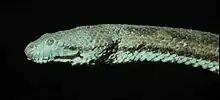Homalopsidae
The Homalopsidae are a family of snakes which contains about 28 genera and more than 50 species. They are commonly known as Indo-Australian water snakes, mudsnakes, or bockadams. They are also known as ular air in Indonesian. They are typically stout-bodied water snakes, and all are mildly venomous. Two monotypic genera are notable for their unusual morphology: Erpeton possesses a pair of short, fleshy appendages protruding from the front of the snout, and Bitia has uniquely enlarged palatine teeth. Cerberus species have been noted to use sidewinding to cross slick mud flats during low tide. Fordonia and Gerarda are the only snakes known to tear their prey apart before eating it, pulling soft-shelled crabs through their coils to rip them apart prior to ingestion.[1]
| Homalopsidae | |
|---|---|
 | |
| New Guinea bockadam Cerberus rynchops | |
| Scientific classification | |
| Kingdom: | Animalia |
| Phylum: | Chordata |
| Class: | Reptilia |
| Order: | Squamata |
| Suborder: | Serpentes |
| Clade: | Colubroides |
| Family: | Homalopsidae |
| Genera | |
|
see text | |
Genera
- Bitia Gray, 1842
- Brachyorrhos Kuhl, 1826
- Calamophis Meyer, 1874
- Cantoria Girard, 1857
- Cerberus Cuvier, 1829
- Dieurostus Berg, 1901
- Djokoiskandarus Murphy, 2011
- Enhydris Sonnini & Latreille, 1802
- Erpeton Lacépède, 1800
- Ferania Gray, 1842
- Fordonia Gray, 1837
- Gerarda Gray, 1849
- Gyiophis Murphy & Voris, 2014
- Heurnia Jong, 1926
- Homalophis Peters, 1871
- Homalopsis Kuhl & Hasselt, 1822
- Hypsiscopus Fitzinger, 1843
- Karnsophis Murphy & Voris, 2013
- Kualatahan Murphy & Voris, 2014
- Mintonophis Murphy & Voris, 2014
- Miralia Gray, 1842
- Myanophis Köhler et al., 2021[2]
- Myron Gray, 1849
- Myrrophis Kumar, Sanders, Sanil & Murphy, 2012
- Phytolopsis Gray, 1849
- Pseudoferania Ogilby, 1891
- Raclitia Gray, 1842
- Subsessor Murphy & Voris, 2014
- Sumatranus Murphy & Voris, 2014
References
- Jayne, B.C.; Voris, H.K.; Ng, P.K.L. (2002), "Herpetology: Snake circumvents constraints on prey size", Nature, 418 (6894): 143, doi:10.1038/418143a, PMID 12110878
- Köhler, Gunther; Khaing, Khin Pa Pa; Than, Ni Lar; Baranski, Damian; Schell, Tilman; Greve, Carola; Janke, Axel; Pauls, Steffen U. (2021-01-22). "A new genus and species of mud snake from Myanmar (Reptilia, Squamata, Homalopsidae)". Zootaxa. 4915 (3): 301–325. doi:10.11646/zootaxa.4915.3.1. ISSN 1175-5334.